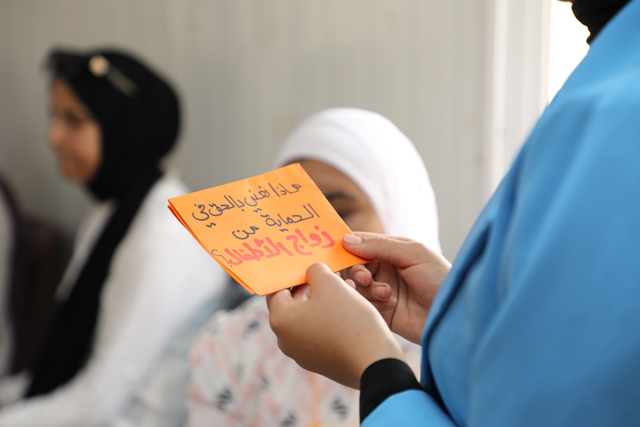You are here
Women Leadership Councils empower Syrian females to ‘make their voices heard’
By Ana V. Ibáñez Prieto - May 23,2018 - Last updated at May 24,2018
AMMAN — Over 400 Syrian women have been trained on human rights and gender through the four Women Leadership Councils (WLCs) established by CARE International over the past year in the governorates of Amman, Zarqa, Irbid and Mafraq, aiming to support Syrian women and girls in Jordan in achieving “effective engagement” with their local communities.
“Based on CARE’s belief in the need to establish partnerships in all aspects of life, our objective was to integrate Syrian women into the Jordanian society,” the NGO explained in a statement issued last Monday, adding that the WLCs also helped participants in “enhancing their ability to deal with the isolation and depression they may be facing after leaving their homes, in addition to the consequences of sexual and gender-based violence (GBV) and their engagement with working environments that are not safe enough for them”.
“When I was first contacted by CARE, I remember being so excited because I felt like my voice was going somewhere and I was actually using the intellect that I worked hard for over the years to help people, like I always did,” said Rana, a former lawyer and Syrian refugee member of the WLC in Amman.
She explained that the team “works closely with women to teach them all kinds of things, from literacy courses in English to GBV awareness and legal advice”.
“We had many sessions about the issue of early and forced child marriage and, right after the first session, girls started asking us for more information like reasons why they shouldn’t get married at an early age, and how to use effective arguments to change the minds of their parents or caretakers,” Rana recalled, expressing her joy over “being able to make a change in the mindset of the young girls, by being the lawyer who had an impact back in Syria”.
The initiative started in 2017, when CARE International selected a total of 48 Syrian women and girls to train them on ways to start the change within their communities. With 12 leaders per governorate, intensive training and workshops were implemented on topics such as leadership skills, communication, human rights, gender, conflict resolution and women's empowerment — and now, beneficiaries are seeing the results.
“When CARE called me and asked me if I’d like to be interviewed for a spot in the WLC, I had my doubts,” Syrian refugee Yasmin recounted, remembering how she went to the interviewer and told her that “they must have gotten something wrong”, as she did not have “a proper education”.
“But she reassured me saying that this isn’t about education, but about leadership,” Yasmin remembered, elaborating on how the initiative has changed her. “I can visibly see a difference in myself, my personality, and the way I deal with people and situations,” she said, adding “my role in the WLC is to ensure that the voices of women — especially Syrians — are heard by organisations and stakeholders. We also listen to people in general and note down their challenges so that we can, in turn, formulate them in a better way and present them to organisations.”
Up to this point, the WLC project resulted in the implementation of 8 community initiatives, according to CARE International sources, who noted that the initiatives were “based on meaningful topics such as combating early marriage, enhancing the role of women and educating the beneficiaries on public safety standards, in addition to teaching English and Arabic and enhancing the positive outlook for the future”.
Related Articles
AMMAN — The United Nations Population Fund in Jordan (UNFPA), with support from the Government of Italy, will provide comprehensive Gender-B
AMMAN — As the humanitarian crisis in Syria and its neighbouring countries enters its 10th year, which has worsened due to the impact of the
AMMAN — Activists and gender-based violence (GBV) specialists on Monday said there is an "urgent need" to establish a national network to un
















